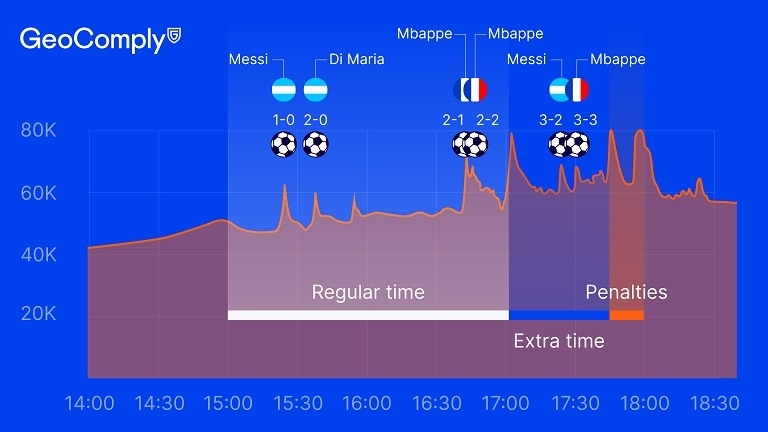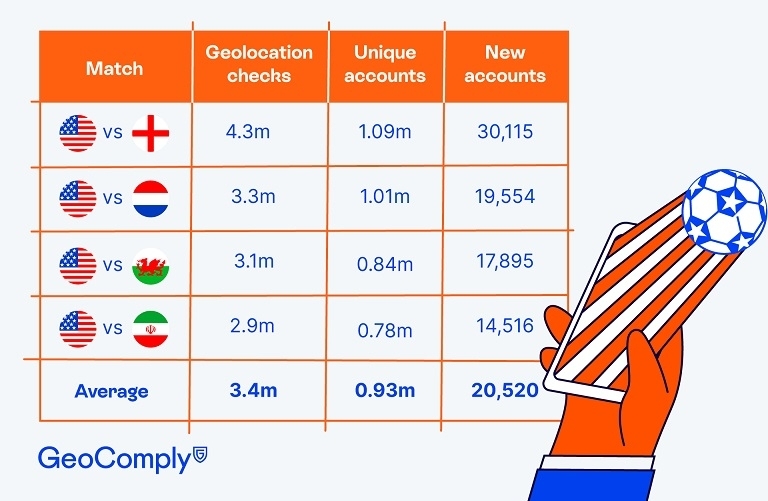

The Argentina-France game attracted more US bettors than the final games of the NCAA’s March Madness, NBA final, and NHL’s Stanley Cup final.
Betting patterns within games largely mirrored those of NFL and NBA games, which generally record just over four bets per user – the same as during the World Cup. A look at the betting patterns around the World Cup Final reveals spikes in activity around each goal, at the beginning of Extra Time and during Penalties.

World Cup betting started strongly. Excluding US states that have regulated during the past year, geolocation checks for the first week of the World Cup were up 34.5 per cent over the same period last year.
Of course, the US is a developing betting market, and it would be expected significant growth from one year to the next. However, isolating the World Cup effect by only measuring weekday betting traffic, it can be seen that transactions increased by an average of 16 per cent per day on weekdays before the World Cup.
Future hosts
This is a significant World Cup for North America. In addition to being the first post-PASPA World Cup tournament, it is the first since Ontario re-regulated its sports betting market. It is also the first World Cup to feature both the US team and Canada’s finest. It is only Canada’s second appearance at the World Cup. The US team did not appear between 1950 and 1990, with Canada’s only other appearance coming in Mexico ‘86.
It will not be the last time they appear together. Canada and the US will co-host the tournament with Mexico in four years. As such, Qatar 2022 is a valuable milestone which gives us an intriguing insight into the popularity of soccer in the minds of the North American public.
Some of the statistics are startling and hugely encouraging. The USA-England match in the group stages drew over 15.3 million viewers, making it the most-watched men’s soccer match ever on English-language TV in America. Argentina’s game against Mexico was the most-watched sporting event in Telemundo’s history, with the Spanish-language broadcast drawing more than 8.9 million viewers.
The USA game against England was also the busiest game involving the future hosts, with 4.3m geolocation checks. The USA’s games attracted more than the average 2.73m geolocation checks across the tournament.

Interestingly, after the World Cup Final, England’s last 16 game against Senegal was the next most popular game with 7.6m geolocation checks. The crucial group game between Germany and Spain was the next most popular with 7.2m.
Within that context, the World Cup in Qatar can be seen as the next stage in the development of the North American soccer betting market.
Elsewhere, the world’s star players have arguably performed better than ever before. Its top teams put on more spectacular performances than at any tournament since 1986. In terms of attracting new viewers and bettors in a country like the US, where the game (and the betting market) is still somewhat in its infancy, the World Cup could not have done a better job.
The USA-England game was among the most attractive to new bettors, with over 30,000 new accounts created for that game alone. Similarly, the World Cup’s opening game between Qatar and Ecuador attracted over 30,000 new accounts. Over 1m new accounts were created during the World Cup – truly a landmark figure for the US betting industry.
Given that this was a World Cup played largely on weekday mornings when most US viewers would be at work, these are hugely encouraging figures. Given a more developed domestic game, a more mature betting industry, and a prime time slot in four years, we can expect a significant boost to these figures.
Source: GeoComply